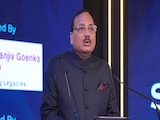Bhushan, 16, a Class 11 student and his 15-year-old sister Renuka, who is in Class 10, live in a one-room house in Delhi's Trilokpuri. They are among thousands of students across India who have not gone to school for the last one year and have to depend on online classes.
The Central Board of Secondary Education's (CBSE) decision to retain 100 per cent syllabus for Classes 9 to 12 for this session, unlike 30 per cent reduction last year, has hit them hard. In their case, the challenge is bigger - they take online classes in evening on their only phone in the family when their father returns home from work.
With a family income of Rs 15,000 a month, their parents can't afford another smartphone. Their mother is a social worker and father is a clerk in a small private office.
"Their father leaves at 7.30-8 in the morning and till evening there is no phone. They miss all the classes. They access the videos only when he comes back, but they miss the opportunity to ask questions to their teachers during live classes. There is nobody to solve their doubts. It has been very hard for them and covering the whole syllabus is out of their reach," said Jyoti Mahore, mother of the two siblings.
According to the new syllabus released by the CBSE, the chapters that were slashed in the last academic year have been restored in the curriculum for the academic session 2021-22.
The CBSE announced last year that reducing the syllabus burden was a one-time initiative as teaching and learning through online medium was fairly new at that time, when the lockdown kicked in amid the pandemic.
The CBSE had dropped chapters on democracy and diversity, demonetisation, nationalism, secularism, India's relations with its neighbours and growth of local governments in the country, among others.
The choice of chapters had drawn criticism from opposition political parties and academicians who said the move was "ideologically driven".
Akshat Srivastava, 15, lives in a posh residential society in Noida. He attends the classes on his personal laptop and has all the resources he needs, but for him too online classes have their limitations.
"I was hopeful they will reduce the syllabus. I am going to appear for my 10th board exams next year and I am worried. It is so easy to get distracted in online classes where you can just open another tab simultaneously to watch YouTube or Netflix. The lack of direct presence of the teacher is another drawback. Our Maths teacher could look at a student and know that he is not getting what is being taught and he would point out and check. Now students can turn their screen blank and wander off to another room," said Mr Srivastava.
His mother Simrat Srivastava said, "It took them last one year to get to know how online classes work. Concentration issues are a big obstacle with online classes. If not 30 per cent, the government should at least reduce 25 per cent or 15 per cent of the syllabus."
Schools have not opened for more than a year in several cities and given the rise in COVID-19 cases, they are unlikely to open any time soon.





_625x300_1529047966012.jpg?downsize=160:120)









